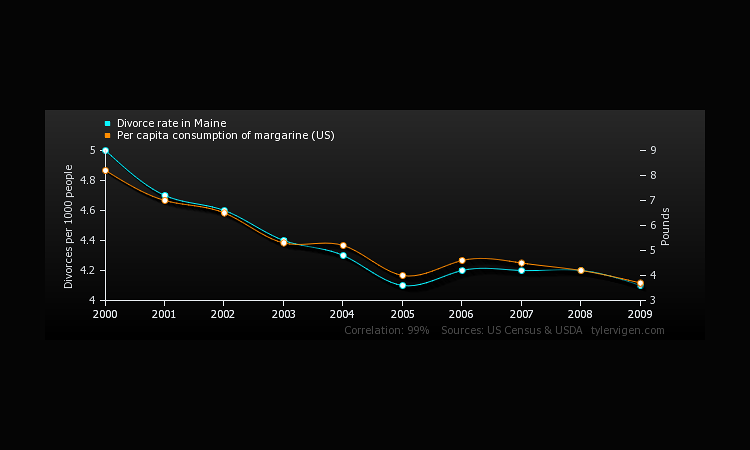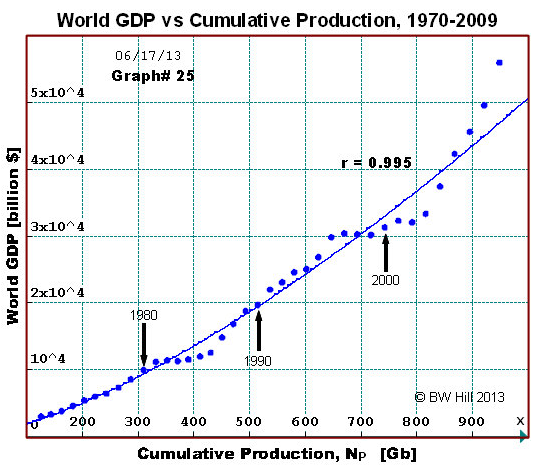You are claiming that energy use and GDP are not related in order to further the claim that the physics of energy use has nothing to do with the economy. That is obviously completely false. GDP is directly related to, and highly dependent on, energy use. Period. That is physics.
No, it's not. Physics says nothing about economy. You can have an economy based on trading rocks by hand and physics doesn't contraindicate that.
]Your graph of margarine and divorces is stupid and has nothing to do with what we are talking about.
You are starting to get it! Just because two datasets show correlation does not mean they show causation.
While you might be trivially correct to note that correlation is not necessarily causation, correlation very often actually is causation.
Again, you have made committed one of the most classic of logical fallacies. From Wikipedia:
================
Correlation does not imply causation is a phrase used in
science and
statistics to emphasize that a
correlation between two variables does not necessarily imply that one
causes the other.
[1][2] Many
statistical tests calculate correlation between
variables. A few go further and calculate the likelihood of a true causal relationship; examples are the
Granger causality test and
convergent cross mapping.
The counter assumption, that
correlation proves causation, is considered a
questionable cause logical fallacy in that two events occurring
together are taken to have a cause-and-effect relationship. This fallacy is also known as
cum hoc ergo propter hoc, Latin for "with this, therefore because of this", and "false cause". A similar fallacy, that an event that follows another was
necessarily a consequence of the first event, is sometimes described as
post hoc ergo propter hoc (
Latin for "after this, therefore because of this").
For example, in a widely studied case, numerous
epidemiological studies showed that women who were taking combined
hormone replacement therapy (HRT) also had a lower-than-average incidence of
coronary heart disease (CHD), leading doctors to propose that HRT was protective against CHD. But
randomized controlled trials showed that HRT caused a small but statistically significant
increase in risk of CHD. Re-analysis of the data from the epidemiological studies showed that women undertaking HRT were more likely to be from higher
socio-economic groups (
ABC1), with better-than-average diet and exercise regimens. The use of HRT and decreased incidence of coronary heart disease were coincident effects of a common cause (i.e. the benefits associated with a higher socioeconomic status), rather than cause and effect, as had been supposed.
[3]
====================
That is why scientists study correlations. You are obviously making a stupid argument on purpose just to distract from the fact that you don't have any logical argument.
My arguments are quite simple.
Oil is not our only source of energy. Thus the parts of our economy that rely on energy are not required to rely on oil, although some now do.
We can afford expensive oil. We have seen cases where oil cost $120 a barrel and our economy continued to grow.
There is no PHYSICS based reason that we must have cheap oil to grow an economy.
Oil will continue to be used as long as its EROEI is lower than alternatives. Once its EROEI is higher, then people will switch to alternatives (as we have already seen happen.)
Your stupid argument is completely without merit, and therefore invalid. I am being sincere in this debate, while you are clearly not being sincere.
Tell you what. I will continue to post facts, and you can continue to post insults, conspiracy theories, failed predictions of Armageddon and little pot emoticons. I am not worried that a third party will decide that you are being sincere and I am not.
The correlation between GDP and oil production is very clear in the chart above.
Precisely! The causation has not been demonstrated. Indeed, the events of the past 5 years indicate that there is no 1:1 correlation, although there is surely a weak correlation (since cheap oil enables some business.)
A 99.5% correlation is not a coincidence!
I have given several examples of where very close correlations are, in fact, coincidences (see above for the "correlation does not imply causation" fallacy.)
Since the relationship shown in the graph above is obviously not a coincidence, how do you explain it?
The same way you can explain the strong correlation between margarine and divorce in Maine.




